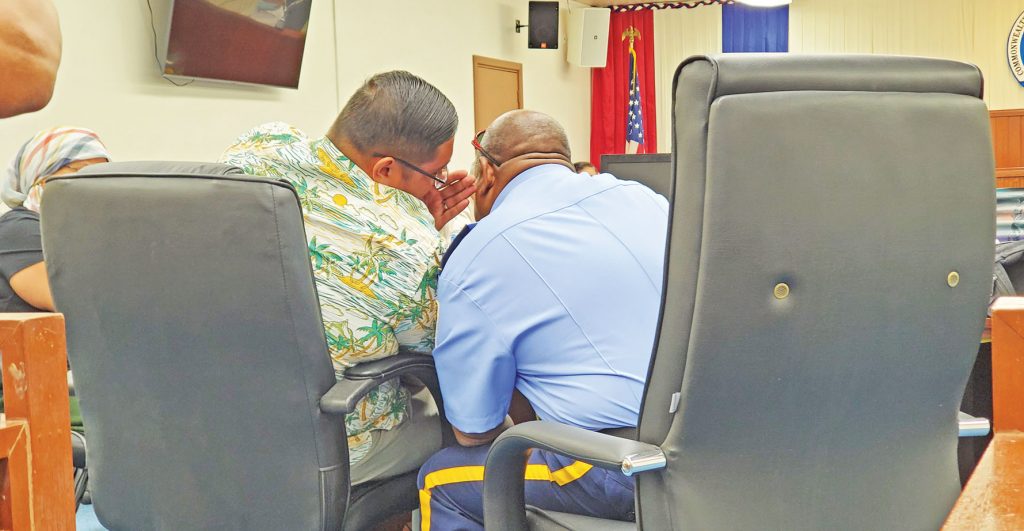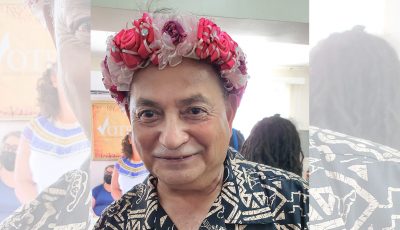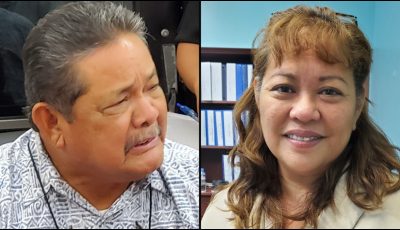Heated arguments mark JGO hearing

Lawyer Anthony Aguon, left, confers with his client, Police Lt. Emery Kaipat of the Department of Public Safety’s Boating Safety, during one of the questions asked yesterday at the hearing before the House of Representatives Judiciary and Governmental Operations Committee. (FERDIE DE LA TORRE)
Police Lt. Emery Kaipat of the Department of Public Safety’s Boating Safety appeared yesterday before the House of Representatives Judiciary and Governmental Operations Committee, but his testimony touched not so much on the subject of the investigation but his constitutional right to testify in Carolinian and have the questions to him translated in Carolinian as well. See video here.
Another point of argument arose when Kaipat’s counsel, Anthony Aguon, pointed out an error in the translation, prompting JGO chair Rep. Celina R. Babauta (D-Saipan) to order a recess at 3:17pm and instruct Kaipat to return for the hearing tomorrow, Friday, at 10:30am. The JGO is investigating Gov. Ralph DLG Torres’ expenditures of public funds and travels.
At the start of the hearing in the morning, House counsel Joseph Taijeron argued that there’s absolutely nothing in the CNMI Constitution that mandates that this proceeding be translated into any other language.
But if Babauta sees the need for a translation, they have that capability, Taijeron added. “If there’s ever an English language proficiency issue, we will not hesitate to translate it into the language that he can understand,” Taijeron said.
Taijeron said if Kaipat understands the question perfectly well, then they’re not going to waste any time translating it into any other language simply for the sake of translation, when he has no reason to misunderstand the question.
The House counsel said it will only unduly delay the proceedings and that Babauta has the right to see fit—as long as Kaipat understands the question—not to translate the question into Carolinian and Chamorro when he already understands it.
“His manner of reply is totally absolutely up to him. We are not saying anything about his ability to speak,” Taijeron said.
Aguon said he would have to disagree with that reading of the CNMI Supreme Court’s ruling in Deleon Guerrero and Jasper cases. “This is not an issue of proficiency. This is an issue of what language to recognize. And the Constitution recognizes Chamorro, Carolinian, and English,” Aguon said.
The lawyer said he is going to ask his client not to speak until it’s translated to Carolinian as he had requested.
Taijeron said the chairwoman is going to instruct Kaipat to comply and if he fails to comply, he may be found in contempt.
Taijeron said if there’s an English proficiency issue, they can always address it by having Kaipat say he doesn’t understand the question.
Babauta told Aguon that they’re not denying his client the constitutional right.
Aguon replied that she (Babauta) is denying Kaipat’s constitutional right.
“No! We are not! We’re not forcing him to speak a language that he is not proficient,” Babauta said.
Aguon said Kaipat just requested to speak in Carolinian. Babauta replied he can do so.
Aguon said they’re asking Kaipat questions in English. Babauta said Kaipat can certainly respond in a language that he is comfortable with.
Aguon then called for a short recess, which Babauta granted.
During recess, Aguon asked if the committee is really going down this contempt line, to which Taijeron replied, “Yes.”
Aguon said he fundamentally disagrees with Taijeron’s position and so if that’s the case, then “that’s what it is.”
Taijeron said they had numerous attorneys look at this issue and not just him. “And the only person saying that the right to speak is an issue is you and you alone,” he said.
Taijeron reiterated that he and Aguon may disagree but Babauta can make the call. “You can’t just disagree with the chairman. And you’re the one who’s going to call the shots?” Taijeron said.
Aguon said he is not going to expose his client to a potential constitutional violation. “That’s why I’m here! That’s my reason, to make sure that none of his constitutional right is violated. Either I have to listen to your interpretation of the law, or else I have to potentially violate his constitutional right,” Aguon said.
Taijeron said that’s the way it works.
“Then if that’s the case, then I guess…” Aguon said, but Taijeron replied, “Don’t do this!”
Taijeron told Kaipat that he does not want him to go to jail for contempt.
Aguon stressed that he is only protecting Kaipat’s constitutional right.
The hearing resumed at 2pm. Kaipat was allowed to testify in Carolinian and have his testimony translated.
Editor’s Note: This story was updated to insert video clips from the event.



























